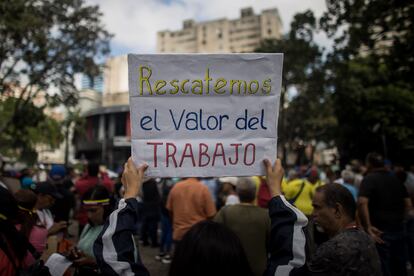The revolving doors of Venezuelan prisons
Police officers violently raided the offices of teachers’ union leader Víctor Venegas and imprisoned him. He recently organized protests for education workers demanding better salaries

Members of the Bolivarian National Police forcibly entered the headquarters of the National Federation of Education Workers in Venezuela (FENATEV), in the city of Barinas, about eight hours south of Caracas. They detained and imprisoned union leader Víctor Venegas, under accusations of terrorism.
A video has gone viral on social media, showing a distraught Venegas speaking into his phone as officials raid the FENATEV headquarters: “We’ve done absolutely nothing wrong. What we’ve done is defend the workers. I’m not going to hide. But it should be known that the police forces are knocking down the doors of the union to take me prisoner.” The fence and the door of the offices were forced open by a large deployment of troops.
The attorney general of the Maduro regime, Tarek William Saab, issued a public statement, in which he announced the measures being taken against Venegas on behalf of the state: “This citizen is involved in the development of activities against the peace of the Republic. He was part of a group that sought to turn the state of Barinas into the epicenter of violent actions.”
At the time he was arrested, Venegas was working on organizing protests by the teachers’ union, to demand better salaries and working conditions. This was after Teachers’ Day was celebrated in the country on January 15. Other groups of union activists had already organized similar and completely peaceful demonstrations in other parts of the country. In his annual message to the National Assembly last week, President Nicolás Maduro mentioned educators and told them that they had his support and understanding.
Throughout the economic collapse that began in 2014 — the same year that Maduro began his presidency, following the death of Hugo Chávez — the conditions of public education in the country have deteriorated drastically. This is despite the fact that, since the Chavista rise to power in 1999, education has been one of the banners of “social investment” in Venezuela.
Over the past decade, the number of teachers who decided to emigrate increased rapidly. After-school care programs were weakened, salaries were dissolved and student absenteeism increased in impoverished areas. An educator in Venezuela earns an average of $30 a month in salary (when converted from Bolivares), plus the occasional bonus. Last year — amid social unrest that has heated up over time — unions representing teachers and healthcare workers organized several well-attended street protests over precarious working conditions and low salaries.
In mid-2023, several union and student leaders — who were doing political and agitation work — were arrested by the Bolivarian Intelligence Service (SEBIN) and sentenced to 16 years in prison for terrorism and criminal association. They were released a few days ago within the framework of agreements penned between the government and the U.S.-backed Venezuelan opposition. The arrest of Venegas, however, keeps the infamous “revolving door” going. Within the framework of the negotiations that the government is engaged in, some political prisoners leave jail… but others quickly replace them.
On his television program, which is broadcast on Wednesdays by the state-owned Venezolana de Televisión channel, Diosdado Cabello, vice-president of the ruling United Socialist Party of Venezuela (PSUV), assumed political responsibility for this measure. He pointed out that the neuralized plan was part of a much broader conspiracy, which supposedly was going to involve the assassination of senior Chavista leaders. However, it’s still unclear whether Venegas is even accused of such a thing.
This alleged process of agitation, according to Cabello’s words, involves several groups of other people (“who have already confessed”), including members of the military. The political leader said that more details will be revealed soon.
According to Cabello, the plan aimed to foment disorder and cause clashes with neighboring Colombia. Expressing himself in characteristically bombastic terms — without offering any evidence — the Chavista strongman issued this warning: “Let the gentlemen of the opposition know [that they should] be very careful with what they do. We’re attentive to everything and we’re not going to let ourselves be knocked down. If you insist on unleashing Bolivarian fury, you will encounter Bolivarian fury.”
Sign up for our weekly newsletter to get more English-language news coverage from EL PAÍS USA Edition
Tu suscripción se está usando en otro dispositivo
¿Quieres añadir otro usuario a tu suscripción?
Si continúas leyendo en este dispositivo, no se podrá leer en el otro.
FlechaTu suscripción se está usando en otro dispositivo y solo puedes acceder a EL PAÍS desde un dispositivo a la vez.
Si quieres compartir tu cuenta, cambia tu suscripción a la modalidad Premium, así podrás añadir otro usuario. Cada uno accederá con su propia cuenta de email, lo que os permitirá personalizar vuestra experiencia en EL PAÍS.
¿Tienes una suscripción de empresa? Accede aquí para contratar más cuentas.
En el caso de no saber quién está usando tu cuenta, te recomendamos cambiar tu contraseña aquí.
Si decides continuar compartiendo tu cuenta, este mensaje se mostrará en tu dispositivo y en el de la otra persona que está usando tu cuenta de forma indefinida, afectando a tu experiencia de lectura. Puedes consultar aquí los términos y condiciones de la suscripción digital.








































